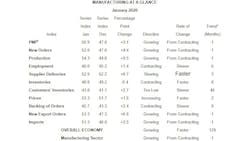Economic activity in the manufacturing sector grew in January, and the overall economy grew for the 129th consecutive month, say the nation’s supply executives in the latest Manufacturing ISM Report On Business.
“Comments from the panel were positive, with sentiment improving compared to December,” said Timothy R Fiore, chair of the ISM Business Survey. “The PMI returned to expansion territory for the first time since July 2019. Demand expanded, with (1) the New Orders Index growing at a moderate rate supported by new export order expansion, (2) the Customers’ Inventories Index remaining at ‘too low’ status and (3) the Backlog of Orders Index contracting for the ninth month, but at a slower rate.
“Consumption (measured by the Production and Employment Indexes) expanded to respond to new order intake, contributing positively (a combined 10.9-percentage point increase) to the PMI calculation. Inputs—expressed as supplier deliveries, inventories and imports—weakened in January, due primarily to increasing contraction in inventories while supplier deliveries remained in expansion territory, but at a modest rate.”
The January PMI registered 50.9%, an increase of 3.1 percentage points from the seasonally adjusted December reading of 47.8%.
Other highlights from the report:
- The New Orders Index registered 52%, compared to the seasonally adjusted December reading of 47.6%.
- The Production Index registered 54.3%, compared to the seasonally adjusted December reading of 44.8%.
- The Backlog of Orders Index registered 45.7%, compared to the December reading of 43.3%.
- The Employment Index registered 46.6%, compared to the seasonally adjusted December reading of 45.2%.
- The unadjusted Supplier Deliveries Index registered 52.9%, compared to the December reading of 52.2%.
- The Inventories Index registered 48.8%, compared to the seasonally adjusted December reading of 49.2%.
- The Prices Index registered 53.3%, compared to the December reading of 51.7%.
- The New Export Orders Index registered 53.3%, compared to the December reading of 47.3%.
- The Imports Index registered 51.3%, compared to the December reading of 48.8%.
“Imports expansion returned, but also at a moderate rate,” Fiore added. “Inputs contributed negatively to the PMI® calculation, a reversal from the previous month. Prices increased for the second month, a positive for 2020.”
Fabricated metal products and miscellaneous manufacturing were among eight manufacturing industries reporting growth in January. Transportation equipment, primary metals and machinery were among eight industries reporting contraction.
“Global trade remains a cross-industry issue, but many respondents were positive for the first time in several months,” Fiore said. “Among the six big industry sectors, Food, Beverage & Tobacco Products remains the strongest, followed closely by Computer & Electronic Products. Petroleum & Coal Products is the weakest.
“Overall, sentiment this month is moderately positive regarding near-term growth.”
Here are some selected comments from respondents:
- “Business has picked up considerably. Many of our suppliers are working at or above full capacity. Tariffs are still a concern and are believed to be a factor in short supply and higher prices of electronic parts. Our profit margin has been somewhat negatively affected by high tariffs, particularly on electronic parts from China.” (Computer & Electronic Products)
- “Small signs of increased global demand in the chemical segment.” (Chemical Products)
- “Continued signs of slowdown in manufacturing.” (Transportation Equipment)
- “Demand for prepared frozen food continues to be strong, but margins compressing as inputs rise with price elasticity preventing accompanying increases.” (Food, Beverage & Tobacco Products)
- “Our customer slowdown has not reached the bottom.” (Petroleum & Coal Products)
- “Our business is starting 2020 stronger than we finished 2019, as we saw a dramatic downturn in orders over the last four months of 2019. Orders are up to start the year, but slightly behind where they were one year ago.” (Fabricated Metal Products)
- “Business is good—above last year, though a little below plan.” (Furniture & Related Products)
- “The annual holiday slowdown was slightly more significant compared to the previous three years, heightening concerns over the 2020 first-quarter forecast.” (Electrical Equipment, Appliances & Components)
- “The lack of faith in the economy seems to be why we cannot sell capital projects.” (Machinery)
- “Tariffs on injection molds will impact selection of mold builder for future jobs. We are more likely to choose domestic rather than offshore.” (Plastics & Rubber Products)

